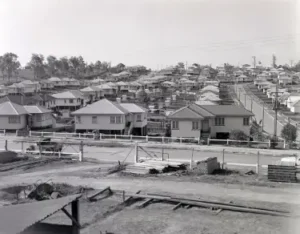[ez-toc]
Description: Easier to Buying a Politician
Is it easier to buy a politician than a house in Australia? Explore the housing crisis and political influence, and how monetary sovereignty can help.
Introduction
Australia is grappling with two significant challenges: a burgeoning housing crisis and the ease with which political influence can be wielded through donations and lobbying. With house prices skyrocketing and political transparency under scrutiny, many Australians are left wondering: is it easier to buy a politician than to buy a house? This article delves into the complexities of both issues, examining historical contexts, current scenarios, and offering solutions to move towards a fairer and transparent society.
The Housing Market Crisis
Historical Context

In the 1950s, Australia’s housing market was markedly different from today. Post-World War II, the government played a crucial role in providing public housing. Approximately 20% of new homes were public housing, offering affordable options for low-income families. This period saw a strong commitment to ensuring that all Australians had access to stable housing.
Current Scenario
Fast forward to today, and the landscape has drastically changed. Public housing now accounts for less than 5% of new homes. The median house price in major cities like Sydney and Melbourne has soared to over AUD 1 million, making homeownership a distant dream for many. According to CoreLogic, housing affordability has declined significantly, with the median house price to income ratio reaching alarming levels.
Challenges
Several factors contribute to the current housing crisis:
1. High Prices: The relentless increase in house prices far outpaces wage growth.
2. Supply and Demand: A persistent imbalance between housing supply and demand worsens the issue.
3. Economic Policies: Policies favouring property investors over first-home buyers have intensified the problem.
Political Influence in Australia
Historical Context
The influence of money in Australian politics is not new. However, the extent and transparency of this influence have evolved. In the past, political donations and lobbying were less scrutinized, allowing significant sway by wealthy individuals and corporations.
Current Scenario: Easier to Buy a Politician

Today, political donations and lobbying activities are more transparent but still pervasive. Major industries, such as mining and real estate, contribute substantial sums to political campaigns. According to the Australian Electoral Commission, political donations have steadily increased, raising concerns about their impact on policy decisions.
Case Studies
– Mining Industry: Significant donations from mining companies have been linked to favourable legislation, such as relaxed environmental regulations.
– Real Estate Sector: Contributions from property developers have coincided with policies beneficial to their interests, further inflating the housing market.
Comparative Analysis
Financial Requirements
Buying a house in Australia requires significant financial resources, including a large deposit, mortgage repayments, and ongoing costs like maintenance and rates. Conversely, political donations, while large, can offer a more immediate and direct return on investment through favourable policy changes.
Accessibility
Entering the housing market is increasingly challenging for average Australians, with stringent lending criteria and unaffordable prices. In contrast, political influence through donations is more accessible to wealthy individuals and corporations, raising concerns about equity and representation in the democratic process.
Outcomes

Homeownership provides long-term stability and investment returns but is currently out of reach for many. Political donations, on the other hand, can yield immediate policy benefits, creating a belief that political influence is more attainable than homeownership.
Societal Impact
Economic Consequences
The housing crisis has broad economic implications. High housing costs strain household budgets, reduce disposable income, and worsen wealth inequality. This dynamic affects overall economic stability and growth.
Political Consequences
The belief that political influence can be bought undermines public trust in democratic institutions. It fosters cynicism and disengagement, threatening the very foundation of representative democracy.
Australia’s Dollar Sovereignty
Australia’s monetary sovereignty allows the federal government to spend on public needs without the constraint of “running out of money.” This unique position can be used to address both housing and political issues.
Housing Solutions
1. Increase Public Housing: Investing in public housing can alleviate the shortage and give affordable options to low-income families.
2. Support First-Home Buyers: Implement targeted incentives for first-home buyers with strict regulations to prevent market exploitation.
3. Supply-Side Measures: Increase housing supply through government-backed construction projects.
Political Reforms
1. Cap Donations: Implement strict caps on political donations to reduce undue influence.
2. Transparency: Enhance transparency in political donations and lobbying activities.
3. Ethics Code: Encourage adoption of Tony Fitzgerald’s code of ethics to promote integrity and accountability.
Evidence Supporting the Headline
Housing Market
– Historical Decline: The decline in public housing from 20% in the 1950s to less than 5% today highlights the shrinking affordable housing options.
– Affordability Statistics: The median house price to income ratio has reached unprecedented levels, making homeownership increasingly inaccessible.
Political Influence
– Mining Industry Influence: Significant donations from mining companies have led to favourable environmental legislation.
– Real Estate Donations: Contributions from property developers have coincided with policies that help the housing industry, inflating prices further.
Tony Fitzgerald’s Code of Ethics
Overview

Tony Fitzgerald’s code of ethics emphasizes transparency, accountability, and integrity in politics. It aims to restore public trust and ensure that political decisions serve the common good.
Importance
The code is crucial for promoting ethical behaviour among politicians, reducing corruption, and enhancing democratic governance.
Reluctance to Sign
1. Conflict of Interest: Many politicians may face conflicts between ethical standards and lucrative political donations.
2. Lack of Accountability: Increased scrutiny and accountability measures can be daunting for those accustomed to the status quo.
3. Political Culture: An entrenched political culture resists change, viewing the code as a threat to established practices.
Incentives for First Home Buyers
Designing Effective Incentives
1. Targeted Support: Focus incentives on low and middle-income first-home buyers to ensure help reaches those in need.
2. Price Caps: Implement price caps on properties eligible for incentives to prevent developers from inflating prices.
3. Supply-Side Measures: Increase housing supply through government-backed construction projects to meet demand.
4. Regulation: Enforce tight regulations to prevent developers from exploiting incentives, ensuring the benefits reach first-home buyers.
5. Monitoring and Evaluation: Continuously check and evaluate the impact of incentives to ensure they achieve desired outcomes without unintended consequences.
Examples
– Singapore: The Housing and Development Board (HDB) provides extensive public housing, ensuring affordability and accessibility.
– Germany: Strict rent controls and tenant protections help support affordable housing options.
Policy Recommendations
Housing Market
1. Increase Public Housing: Government investment in public housing to address shortages and offer affordable options.
2. Support First-Home Buyers: Implement targeted incentives with strict regulations to prevent market exploitation.
3. Increase Supply: Boost housing supply through government-backed construction projects.
Political System
1. Cap Donations: Implement strict caps on political donations to reduce undue influence.
2. Enhance Transparency: Improve transparency in political donations and lobbying activities.
3. Adopt Ethical Standards: Encourage the adoption of Tony Fitzgerald’s code of ethics to promote integrity and accountability.
Conclusion
Australia faces significant challenges in both housing affordability and political integrity. By using monetary sovereignty, increasing public housing, supporting first-home buyers, and adopting strict political reforms, Australia can move towards a fairer and transparent society. Addressing these issues requires a commitment to ethical governance and a focus on the common good.
Question for Readers
What changes do you think are necessary to make housing more affordable and politics more transparent in Australia?
Call to Action
Join advocacy groups, support policy reforms, and take part in discussions on social media. Share this article with your contacts and widely on your social media.
References
CoreLogic. “Australian Housing Market Update. “CoreLogic: https://www.corelogic.com.au/research/news
Australian Electoral Commission. “Political Donations.” AEC : https://www.aec.gov.au/Parties_and_Representatives/financial_disclosure/
Fitzgerald, Tony. “Fitzgerald Inquiry Report. “Queensland Government: https://www.qld.gov.au/about/government/history/fitzgerald-inquiry
